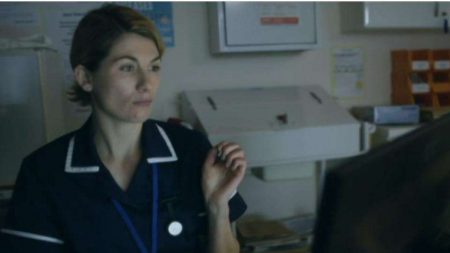2017 was something of an eventful year for British actor Jodie Whittaker. When the BBC announced on the 16th of July that she would be the one to replace the incumbent Peter Capaldi as the star and titular character of Doctor Who, her public profile was elevated to heretofore unseen heights. Pandemonium – as is always the case when a new Doctor is cast – ensued, which was of course exacerbated by the fact that Whittaker is the first woman to play this character; but so, the following month, did the broadcast of her then current television vehicle. Trust Me was a hospital drama mini-series, cannily scheduled on Tuesdays at 9pm after Holby City, in which a nurse (Whittaker) assumes the professional identity of a doctor, and gets away with it. In itself this is a fairly politically charged premise for a BBC television series, but closer scrutiny of some of Trust Me’s expositional set-up, and in relation to cognate real world events that are mobilised in service to the plot, reveals the great extent to which the inaugural episode sets the series up to be a searing critique of toxic cultures of public sector management, conspiracies of silence over managerial and political incompetence in the administration of the NHS, the devaluation of practical skills and emotional labour in the nursing profession, and the perils and pitfalls of whistleblowing for ordinary healthcare staff working at the coal face of the situations produced by these things.
At the outset Whittaker plays nursing sister Cath Hardacre, a long-serving member of the A&E department at Sheffield Alderman Hospital. Arriving for work, Cath happens upon a patient named Maggie who has apparently been left unattended in a cubicle for a considerable period of time in soiled bed-sheets and soiled clothes. Cath’s demeanour doesn’t crack for a moment. Instead she acts with alacrity in both practical and affective ways to put the patient at ease, restore her physical comfort, and restore the cleanliness of her bed. The depicted scenario is a clear allusion to the allegations (and subsequently proven realities) of patient neglect and deficient standards of care that emerged from scandals such as the one involving Stafford Hospital and mid-Staffordshire NHS trust in 2008. The characterisation of Cath here as responsible, caring and capable operates as clear discursive pushback against the culture of blame being fostered in public and political discourse at that time, which pointed the finger at nurses, and glossed over the realities of the impossible working conditions produced for them by management and government.
Called away to an emergency Cath, in a scene highly reminiscent of equivalent scenarios and dynamics between junior doctors and senior nurses described in Max Pemberton’s eye-opening memoir Trust Me I’m a Junior Doctor,[1] finds a very young-looking junior physician struggling with a cannula[2] and panicking as the patient goes into cardiac arrest. Without hesitation, Cath takes charge of the situation instructing the ineffectual junior doctor to step away and the rest of the team to commence CPR. Cath’s impatience and frustration with the inexperience and indecisiveness of the junior A&E doctors that she works alongside later becomes her downfall, following her decision to abandon her plans to blow the whistle to the press on the entrenched and ongoing patient neglect she has witnessed, and confront the NHS Trust for which she works with her evidence directly. Placing her trust in her employers to act with the institutional integrity she has come to expect of the NHS proves to be a strategic error for Cath, as the Trust uses her strained relationship with her junior doctor colleagues as ammunition (in the guise of spurious allegations of bullying) to discredit her, remove her from her job and instigate a cover-up of the negligence allegations and the evidence gathered by Cath that corroborates them. The scandal at mid-Staffs and the excoriation of front line care-giving nurses that accompanied it in the public discourses that emerged, are thus crucial contextual factors in relation to which the premise of Trust Me, and the revenge fantasy narrative trajectory of Whittaker’s character are her narrative resolution are best understood.
The narrative conceit that ensues asks audiences to suspend their disbelief considerably (notwithstanding documented real-world instances of imposter doctor identity fraudsters that inspired former A&E doctor Dan Sefton to write the series)[3] as Cath enacts a highly apt escape/revenge fantasy following her best friend Alison Sutton’s emigration to New Zealand, and her withdrawal from the medical profession. Retrieving Alison’s professional credentials from the rubbish bin to which they have been consigned by their owner, Cath packs up and moves to Edinburgh where she lands a job as an A&E doctor having simply augmented her existing skills as an experienced A&E nurse (patients and colleagues are quick to remark on what a warm and effective bedside manner she has – *for a doctor*) by studying YouTube videos of medical procedures and putting them into practice on her unsuspecting patients. As the series goes along it becomes less interested in situating the action in relation to real-world political lightning rods, and more interested in Cath’s interiority and changing personal circumstances. But in the build-up to the identity switch, the parallels to be drawn between Cath’s situation and the events that produced the mid Staffs scandal are striking and pointed.
At the time of writing, an ongoing crisis in staffing at NHS hospitals all over the country – especially during the current winter months when the operations of the health service are placed under increased and intensified pressure – continues to cause controversy, generate debate and make news media headlines.[4] Front line care-workers continue to be asked to do more and more with less and less. It seems little wonder then that escape and/or revenge narratives like Trust Me have emerged as fantasies through which we might imagine fanciful (albeit highly plausible) means by which NHS workers, of the kind for which Jodie Whittaker’s Cath Hardacre/Ali Sutton is an avatar, might empower themselves to intervene in the invidious working situations in which they have been placed by a succession of governments, the most recent of which has proven itself hell-bent on dismantling the institution that these workers serve.
Hannah Hamad is Senior Lecturer in Media and Communication at Cardiff University, and the author of Postfeminism and Paternity in Contemporary US Film: Framing Fatherhood (New York and London: Routledge, 2014).
Footnotes
[1] Max Pemberton, Trust Me I’m a Junior Doctor (London: Hodder & Stoughton, 2008).
[2] See Pemberton pp 60-63. A cannula, as Pemberton explains, is a “tiny little tube that is put into a vein so that fluids or medicine can go directly into the blood,” (p 60) and inserting one is “a job that usually falls to the junior doctors.” (p 61)
[3] Tim Masters, ‘Jodie Whittaker on her other doctor role in Trust Me’, http://www.bbc.co.uk/news/entertainment-arts-40263351, 26th July 2017; Radhika Sanghani, ‘Trust me: ‘fake’ doctors on the NHS are more common than you realise’, The Telegraph, http://www.telegraph.co.uk/women/life/trust-fake-doctors-nhs-common-realise/, 13th August 2017.
[4] Today, for example, health secretary Jeremy Hunt was forced to defend plans to postpone already scheduled non-urgent NHS surgeries, Sarah Marsh, ‘Jeremy Hunt defends decision to postpone non-urgent NHS surgery’, The Guardian https://www.theguardian.com/society/2018/jan/03/patients-association-charity-attacks-ministers-over-nhs-winter-crisis, 3rd January 2018.





![BRUCE’S CHOICE <br> by not only Andrew Pixley [i]](https://cstonline.net/wp-content/uploads/2020/06/BrucesChoice_image02-440x264.png)

